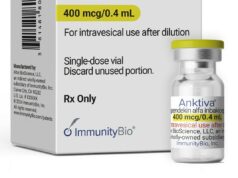
Spring is a time of growth and renewal, and a new slate of biotech companies has raised cash to grow their drug pipelines filled with potential new treatments for cancer, neurological disorders, and more. Here’s a look back at some recent biotech financings:
—Flare Therapeutics closed $123 million in Series B financing as it prepares to enter the clinic this year. The Cambridge, Massachusetts-based company is developing small molecules that target transcription factors to treat cancer. Lead program FX-909 targets a transcription factor called PPARG as a potential treatment for urothelial cancer. The company’s latest financing was led by GordonMD Global Investments LP and Pfizer Ventures.
—EpiBiologics launched with a $50 million in financing. The San Mateo, California-based startup is developing an antibody-based approach to targeted protein degradation that takes the modality to membrane proteins and targets outside of the cell. The technology is based on research licensed from the University of California, San Francisco. EpiBiologics’ Series A round was co-led by Mubadala Capital and Polaris Partners.
—Microbiome-based therapies developer Mbiomics closed €13 million in financing. The Munich, Germany-based biotech uses computational techniques to improve understanding of the interaction between the microbiome and the host, enabling the design of microbiota combinations. MIG Capital led the Series A round.
—Switch Therapeutics emerged with $52 million to support its development of a new kind of RNA interference therapy. The South San Francisco-based biotech is developing therapies that activate only in selected cells, enabling this therapeutic approach to address targets that require more precision. Switch’s lead program is for an undisclosed central nervous system disease. Insight Partners and UCB Ventures co-led the startup’s Series A financing.
—In other RNA interference news, Aldena Therapeutics raised $30 million. The company aims to treat skin diseases via the transepidermal delivery of its therapies. Of the six compounds in its pipeline, Aldena expects three will be ready for investigational new drug application filings in 2024. Aldena, which splits its operations between Boston; Lausanne, Switzerland; and London, was founded by Medixci, which provided the startup’s new financing.
—Seamless Therapeutics, which is developing a new gene-editing platform technology, unveiled $12.5 million in seed financing. The Dresden, Germany-based biotech says its technology can enable the targeting of any site within the genome. The company said it will use the new capital build a pipeline of drug candidates for diseases that were not specified, and to expand its presence in Europe and the U.S. Seamless’s financing was co-led by wellington Partners and Forbion.
—Fibrosis-focused Mediar Therapeutics unveiled $105 million in financing, including an $85 million Series A round. The startup, based on fibrosis research from Massachusetts General Hospital and Brigham and Women’s Hospital, is developing antibody treatments that target the myofibroblast, a type of cell key to driving fibrosis progression. The Series A financing was co-led by Novartis Venture Fund and Sofinnova Partners.
—Amyotrophic lateral sclerosis developer QurAlis closed an $88 Series B round of financing to continue early clinical development of its two lead programs for the neuromuscular disorder. EQT Life Sciences, Droia Ventures, and Sanofi Ventures led the latest investment in the Cambridge-based company.
—Third Rock Ventures led the $100 million Series A financing of Rapport Therapeutics, a biotech developing drugs for neurological disorders. Rapport, which splits its operations between Boston and San Diego, has technology that identifies receptor-associated proteins that enable the identification of precision-targeted small molecules. The company’s lead program is in Phase 1 testing for treating drug-resistant seizure disorders.
Photo: RomoloTavani, Getty Images








